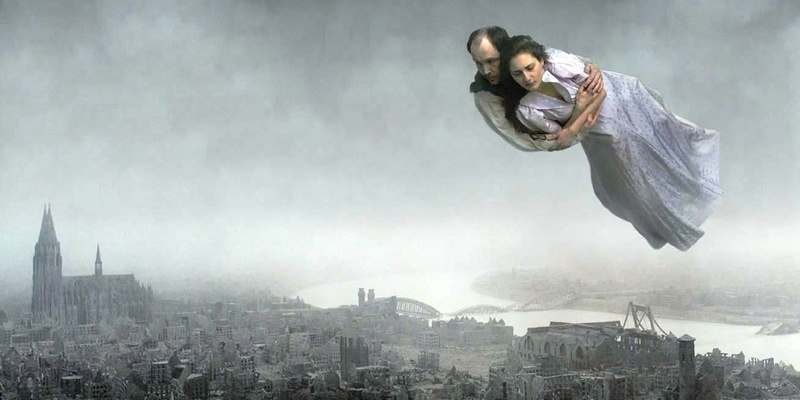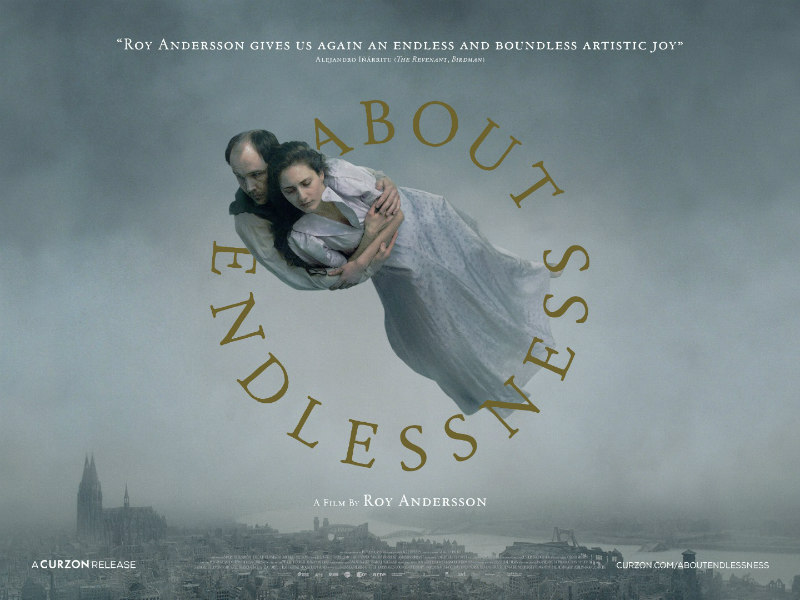
Review by
Eric Hillis
Directed by: Roy Andersson
Starring: Jan-Eje Ferling, Thore Flygel, Tatiana
Delaunay, Ania Nova, Lesley Leichtweis Bernardi

Were it not for a certain Terrence Malick, Sweden's
Roy Andersson would no doubt hold the title for the most remarkable
filmmaking comeback of recent decades. Like Malick, Andersson disappeared
for several years, eventually returning with a distinctive new filmmaking
style to win over a new generation of cinephiles. After the success of his
1970 debut, A Swedish Love Story, and the subsequent failure of his 1975 sophomore effort,
Giliap, Andersson retired from feature filmmaking and immersed himself in
developing his own Studio, Stockholm's 'Studio 24', a space where he could
build his own cinematic world away from commercial pressures.

Studio 24 eventually bore fruit with Andersson's 2000 comeback,
Songs from the Second Floor, which established what we now know as the Andersson template, a series of
largely standalone, though sometimes connected vignettes designed to
interrogate contemporary society in Sweden and beyond. Continuing this
method through 2007's You, the Living, 2015's wonderfully titled A Pigeon Sat on a Branch Reflecting on Existence, and now About Endlessness, Andersson's films resemble an esoteric comedy sketch show. There are
elements of Monty Python, early Woody Allen and the more absurdist elements
of Bunuel and Lynch, though it's not all laughs, with Andersson often
interrupting the chuckles to detail humanity at its bleakest (Hitler pops up
in his latest, along with the bloody aftermath of an Islamic honour
killing).

Taking advantage of his self-contained studio, Andersson constructs
immaculately detailed sets, a mix of practical construction and well mounted
greenscreen backdrops. The effect on the audience is of being a giant,
stooping to peer into lovingly fashioned dioramas, or of observing a
particularly morose child play the computer game 'The Sims'. Andersson
populates his world with a mixture of historical figures and everyday
residents. About Endlessness occurs largely in a bleak, grey
city, whose citizens have a sickly pallor as though they're extras in a
zombie film. It has the look of how western propaganda liked to portray East
Berlin, a miserable metropolis populated by people simply getting by.
Most of the people we meet here are merely getting by, though that takes on
different meanings as per the individual concerned. Some don't interrogate
existence too much, like the psychologist who tells his client, a priest who
has lost his faith, that he should simply be content with being alive. For
some, being alive isn't enough - "I don't know what I want," cries a
despondent passenger on a tram. For others, life is an ongoing marvel.
"Isn't it quite fantastic?" asks a café customer gazing on the snow falling
outside the windows, a sentiment dismissed by his fellow patrons. "I think
so at least," he mutters to himself. In the film's most delightful sequence,
three young women pause outside a café to dance goofily to the music
emanating from within. Others fail to embrace life because they judge
themselves by their perceived failures, such as the man who breaks the
fourth wall to air his grievances about a former classmate who has overtaken
his station in life.

All of this is overseen by some disembodied female narrator ("I saw a man,"
"I saw a woman") whose neutral timbre suggests she's dispassionately taking
stock of humanity, like a contestant trying to remember the household items
that pass by their eyes on 'The Generation Game'. Andersson seems to suggest
that there's some sort of creator observing us, but that they may no longer
recognise us, like a father shaking his head at the posters of androgynous
pop stars on his son's bedroom wall. Have we evolved past this creator's
original purpose? Are they proud of us or ashamed? As Andersson's vignettes
outline, there's ample argument for both. We've done our best to destroy our
world, but if pretty girls can dance in the street like nobody's watching
and an aging man can take pleasure in watching snow descend on his city's
streets, perhaps we're not so bad after all.
About Endlessness might some day be uploaded by SETI as a
document of the human race for any prospective alien visitors who stumble
across our signal, as for better or worse, all of human life is captured in
Andersson's work.

